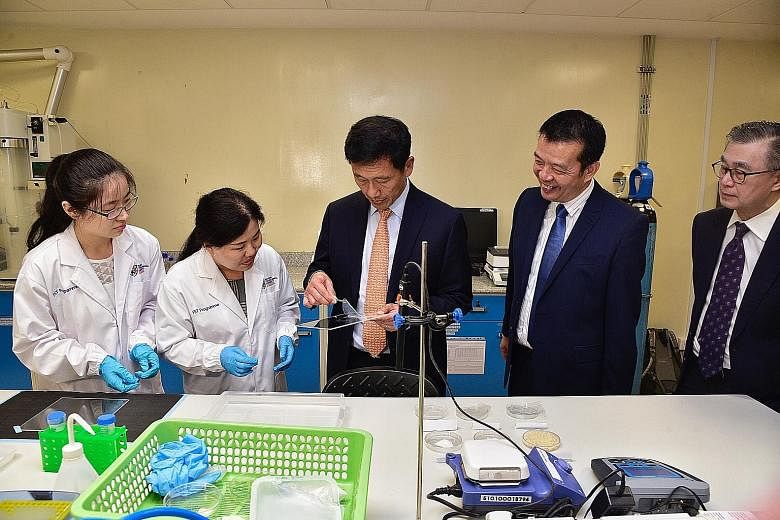Imagine food waste being turned into biodegradable food packaging or even returned to the food chain to enhance a product's nutritional value.
Nanyang Technological University (NTU) is teaming up with food and beverage company F&N for the next four years so that these innovations can find their way into food products sold commercially.
The joint laboratory will be part of the university's Food Science and Technology programme.
The F&N-NTU F&B Innovation Lab, located in the School of Chemical and Biomedical Engineering, was launched yesterday by Minister for Education Ong Ye Kung.
National Environment Agency figures show that the amount of food waste generated in Singapore has increased by about 40 per cent over the past 10 years. Only 16 per cent of more than 800,000 tonnes of food waste produced here in 2017 was recycled.
Professor Subra Suresh, president of NTU, said in his speech that the lab will develop new ways to reduce food wastage by prolonging the shelf life of food produce.
Food sustainability and security are important areas of concern for Singapore, where more than 90 per cent of the food consumed is imported.
He added: "Currently, traditional food-processing technology mainly targets the storage and transportation aspects of F&B products, but does not adequately address the large amount of food waste that arises from manufacturing processes."
To plug that gap, the joint lab will tap the university's existing research capabilities. For example, it will look at more effective methods of recovering food nutrients from food waste, before returning them to the food chain.
Professor William Chen, director of the Food Science and Technology programme, said that among other things, the lab will look at sustainable ways to incorporate micronutrients that are produced as a by-product of the fermentation process into F&N products to enhance their nutritional value. The micronutrients include amino acids, vitamins and antioxidants.
But he said it can take up to five years for innovations in the lab to be applied to food products on a commercial level.
About 30 researchers from NTU and F&N's research and development department, as well as students from the university's programme, will be involved in research projects funded by the food and beverage company.
F&N's chief executive of non-alcoholic beverages Lee Meng Tat said of the company's first long-term joint research partnership with an academic institution: "This partnership offers us the opportunity to tap NTU's strength in research excellence as well as its cutting-edge facilities to enhance innovation."
He added: "In line with our commitment to deliver sustainable business practices, our collaboration with NTU will see the furthering of our green efforts, as well as catering to the health and nutritional needs of our consumers."
In 2016, Singapore launched its Food Manufacturing Industry Transformation Map with the vision of developing the country into the leading food and nutrition hub in Asia with globally competitive food companies.


